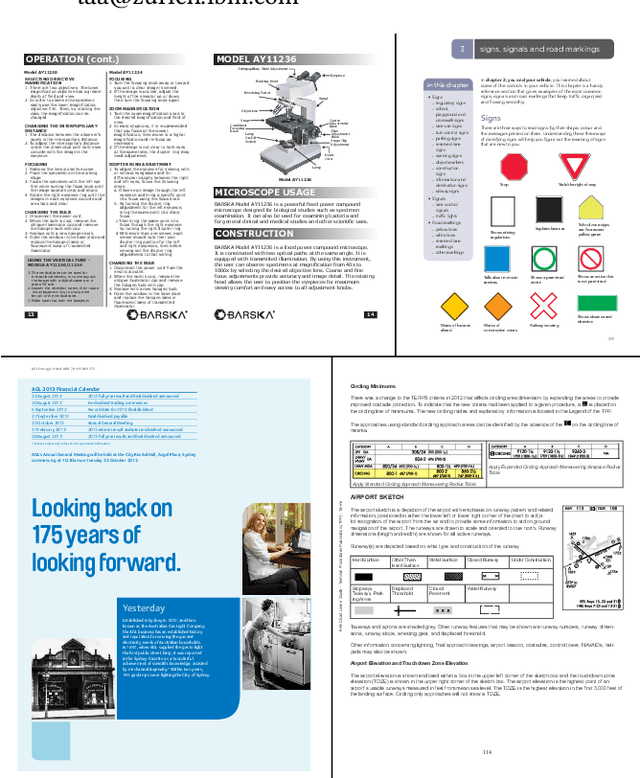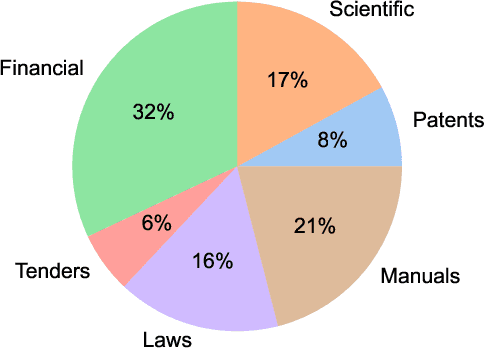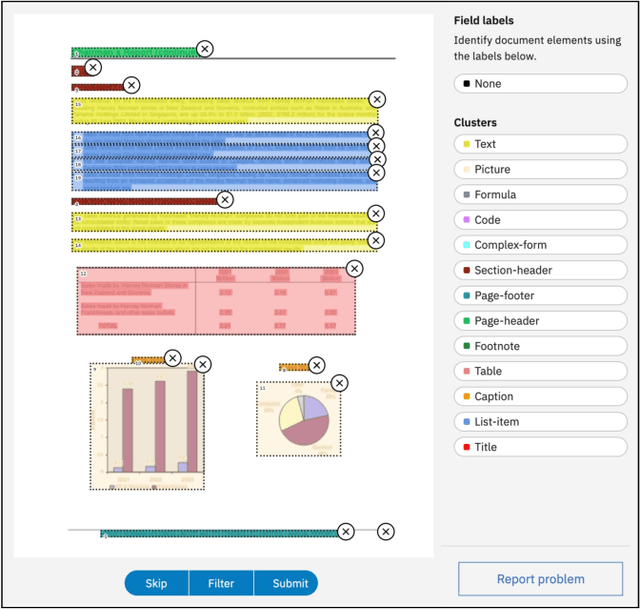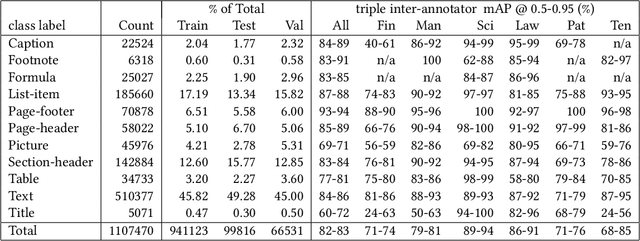Peter W J Staar
DocLayNet: A Large Human-Annotated Dataset for Document-Layout Analysis
Jun 02, 2022



Abstract:Accurate document layout analysis is a key requirement for high-quality PDF document conversion. With the recent availability of public, large ground-truth datasets such as PubLayNet and DocBank, deep-learning models have proven to be very effective at layout detection and segmentation. While these datasets are of adequate size to train such models, they severely lack in layout variability since they are sourced from scientific article repositories such as PubMed and arXiv only. Consequently, the accuracy of the layout segmentation drops significantly when these models are applied on more challenging and diverse layouts. In this paper, we present \textit{DocLayNet}, a new, publicly available, document-layout annotation dataset in COCO format. It contains 80863 manually annotated pages from diverse data sources to represent a wide variability in layouts. For each PDF page, the layout annotations provide labelled bounding-boxes with a choice of 11 distinct classes. DocLayNet also provides a subset of double- and triple-annotated pages to determine the inter-annotator agreement. In multiple experiments, we provide baseline accuracy scores (in mAP) for a set of popular object detection models. We also demonstrate that these models fall approximately 10\% behind the inter-annotator agreement. Furthermore, we provide evidence that DocLayNet is of sufficient size. Lastly, we compare models trained on PubLayNet, DocBank and DocLayNet, showing that layout predictions of the DocLayNet-trained models are more robust and thus the preferred choice for general-purpose document-layout analysis.
Corpus Conversion Service: A Machine Learning Platform to Ingest Documents at Scale
May 24, 2018



Abstract:Over the past few decades, the amount of scientific articles and technical literature has increased exponentially in size. Consequently, there is a great need for systems that can ingest these documents at scale and make the contained knowledge discoverable. Unfortunately, both the format of these documents (e.g. the PDF format or bitmap images) as well as the presentation of the data (e.g. complex tables) make the extraction of qualitative and quantitive data extremely challenging. In this paper, we present a modular, cloud-based platform to ingest documents at scale. This platform, called the Corpus Conversion Service (CCS), implements a pipeline which allows users to parse and annotate documents (i.e. collect ground-truth), train machine-learning classification algorithms and ultimately convert any type of PDF or bitmap-documents to a structured content representation format. We will show that each of the modules is scalable due to an asynchronous microservice architecture and can therefore handle massive amounts of documents. Furthermore, we will show that our capability to gather ground-truth is accelerated by machine-learning algorithms by at least one order of magnitude. This allows us to both gather large amounts of ground-truth in very little time and obtain very good precision/recall metrics in the range of 99\% with regard to content conversion to structured output. The CCS platform is currently deployed on IBM internal infrastructure and serving more than 250 active users for knowledge-engineering project engagements.
Corpus Conversion Service: A machine learning platform to ingest documents at scale
May 15, 2018



Abstract:Over the past few decades, the amount of scientific articles and technical literature has increased exponentially in size. Consequently, there is a great need for systems that can ingest these documents at scale and make their content discoverable. Unfortunately, both the format of these documents (e.g. the PDF format or bitmap images) as well as the presentation of the data (e.g. complex tables) make the extraction of qualitative and quantitive data extremely challenging. We present a platform to ingest documents at scale which is powered by Machine Learning techniques and allows the user to train custom models on document collections. We show precision/recall results greater than 97% with regard to conversion to structured formats, as well as scaling evidence for each of the microservices constituting the platform.
 Add to Chrome
Add to Chrome Add to Firefox
Add to Firefox Add to Edge
Add to Edge